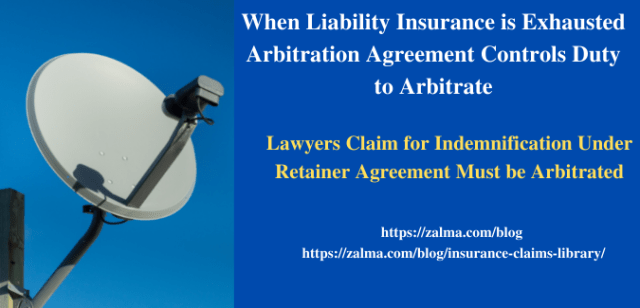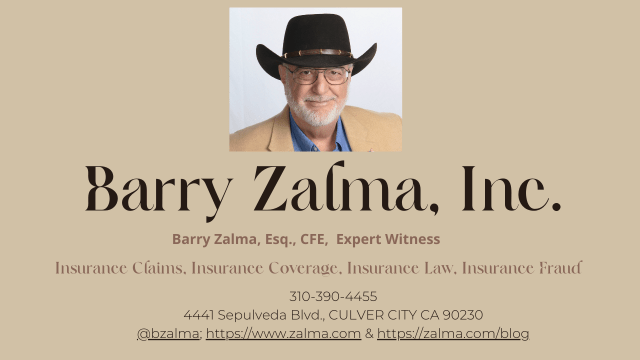When Liability Insurance is Exhausted Arbitration Agreement Controls Duty to Arbitrate
Lawyers Claim for Indemnification Under Retainer Agreement Must be Arbitrated
 AT&T Services, Inc. (“AT&T”) moved the USDC to compel arbitration, pursuant to the Federal Arbitration Act. In Lonstein Law Office, P.C., Julie Lonstein, Wayne D. Lonstein v. Evanston Insurance Company, Markel Service Incorporated, AT&T Services, Inc., No. 20-cv-9712 (LJL), United States District Court, S.D. New York (January 6, 2022) the USDC resolved the dispute.
AT&T Services, Inc. (“AT&T”) moved the USDC to compel arbitration, pursuant to the Federal Arbitration Act. In Lonstein Law Office, P.C., Julie Lonstein, Wayne D. Lonstein v. Evanston Insurance Company, Markel Service Incorporated, AT&T Services, Inc., No. 20-cv-9712 (LJL), United States District Court, S.D. New York (January 6, 2022) the USDC resolved the dispute.
BACKGROUND
Plaintiff Lonstein Law Office, P.C. (“LLO” and together with Julie and Wayne Lonstein (“Plaintiffs”)) is a law firm located in Ellenville, New York. Julie C. Lonstein and Wayne D. Lonstein are the principals of LLO. AT&T is the successor-in-interest to DirecTV, Inc. The complaint defines AT&T, as successor-in-interest to DirectTV, Inc., as “DIRECTV,” and the allegations of the complaint recited herein use the same definition unless otherwise noted.
The Relationship Between LLO and DIRECTTV/AT&T
Beginning in 2006, LLO was retained by DIRECTV to identify, investigate, and bring claims and/or civil actions against businesses or individuals throughout the United States who illegally acquired DIRECTV services, either by acquiring it without payment or by misrepresenting that they were individuals when in fact the services were actually being received and exhibited in a commercial establishment. LLO’s agreement to provide these services to DIRECTV was documented in a retainer agreement (the “Retainer Agreement”) between LLO and DIRECTV dated on or about October 2, 2009. Pursuant to the Retainer Agreement, DIRECTV retained LLO to represent it “in the investigation and litigation of claims against individuals and entities for the commercial misuse and unauthorized exhibition of DIRECTV satellite programming services” in exchange for a contingency fee.
The parties agreed that they would share equally the costs of auditing and investigation fees incurred in the documentation of fraud, misuse, and/or piracy through the efforts of an outside firm, Signal Auditing, Inc., and that LLO could pay DIRECTV’s share from client funds it was permitted to hold in trust. LLO was required to obtain DIRECTV’s approval on a case-by-case basis prior to filing any lawsuit and was further required to maintain professional liability coverage with minimum limits of $1 million “per occurrence, ” DIRECTV represented to LLO that it had “the rights upon which it is basing its claims of infringement, misuse or piracy.”
In addition, the Retainer Agreement has a mutual indemnification provision. As a result of the actions of LLO in accordance with the Retainer Agreement multiple suits were filed against LLO and DIRECTV. The Retainer Agreement was terminable by either party, with or without cause, on 14-days prior notice to the other party. It is signed by Julie C. Lonstein on behalf of LLO.
On or about February 15, 2019, Plaintiffs entered into a wind-down agreement (the “Wind Down Agreement”) with AT&T, as successor to DIRECTV. The Wind Down Agreement recognized that AT&T retained LLO over the past twelve years and stated that the program was being discontinued. For a one-time non-refundable payment from AT&T, LLO agreed to continue to represent AT&T during a one-year period following the effective date of the Wind Down Agreement. The Wind Down Agreement stated that it superseded all prior agreements between the parties.
Section 5.01 of the Wind Down Agreement contains a mutual release by the parties of claims that they might have against one or another. The Wind Down Agreement also contains a broad arbitration clause. The Wind Down Agreement was signed on February 15, 2019 by Wayne D. Lonstein and Julie C. Lonstein individually and on behalf of LLO, and it was signed on February 19, 2019 by AT&T.
The Lawsuits Against DIRECTV and LLO
During the term of the Retainer Agreement, Plaintiffs were named, sometimes alongside DIRECTV, in four lawsuits relating to the actions by Plaintiffs and DIRECTV in asserting its rights against the plaintiffs in the four lawsuits.
THE PROBLEM CAUSED BY INSUFFICIENT LIMITS ON E&O POLICY
The Insurance Dispute – Multiple Suits a Single Occurence
Plaintiffs are parties to Insurance Policy No. LA806580 with Evanston Insurance Company (“EIC”) providing professional malpractice coverage for the claims period June 1, 2013 to June 1, 2014 (the “Policy”). The Policy provides coverage of $1 million per occurrence less a deductible subject to an aggregate limit of liability of $3 million.
Plaintiffs tendered and timely provided written notice of the Actions to EIC, which then provided for Plaintiff’s legal representation in the Actions. By letter dated July 31, 2020, however, EIC notified Plaintiffs that the Policy limit of $1 million was exceeded by the payment of legal fees and/or expenses and that Evanston’s obligations pursuant to the Policy had expired (the “July 31, 2020 Letter”). The July 31, 2020 Letter asserted “that each of the Actions ar[ose] out of a series of related Wrongful Actions” and that, as a result, “the Actions should be treated as a single claim/occurrence as defined in the Policy, ” subject to the $1 million limits of liability. Pursuant to the July 31, 2020 Letter, EIC refused to pay invoices from Lewis Brisbois in the amount of $42,153.05. Lewis Brisbois also has remitted to Plaintiffs invoices for an additional $59,604.30 for defense costs and it is claiming the approximate sum of $200,000 remains due and outstanding in connection with its representation of LLO in the Actions.
Plaintiffs seek indemnification from DIRECTV in the Actions since the insurance is exhausted. They allege that have demanded that DIRECTV indemnify and defend Plaintiffs, but that DIRECTV has nonetheless refused to do so.
Plaintiffs bring claims for breach of contract and breach of good faith and fair dealing and seek a judgment declaring that DIRECTV is obligated to defend and indemnify Plaintiffs against the claims that are asserted in the Actions as well as an order of specific performance against DIRECTV.
DISCUSSION
The Court’s role on a motion to compel arbitration is narrow. Plaintiffs do not dispute that there is a valid arbitration agreement between LLO and AT&T. They affirmatively allege that they entered into the Wind Down Agreement with AT&T, which contains a broad arbitration provision. They do not identify any generally applicable contract defenses, such as fraud, duress, or unconscionability, that could invalidate the arbitration agreement.
The arbitration clause in the Wind Down Agreement vests in the arbitration panel in the first instance the decision whether any particular dispute falls within that clause and should be subject to arbitration.
First, since there is a valid and enforceable arbitration agreement between the parties and since the parties agreed that the arbitrator-and not a court-would decide the scope of that provision, Plaintiffs are making their argument in the wrong tribunal. Having made that bargain, Plaintiffs must convince the arbitrators, and not this Court, that the dispute should not be arbitrated.
AT&T has moved for a stay and Plaintiffs do not oppose a stay. Accordingly, the Court will stay this matter until the arbitration is completed.
ZALMA OPINION
Lawyers errors and omissions insurance invariably contain a burning limits clause that requires the limit of liability to be reduced as investigation and defense costs are incurred. LLO only acquired a $1 million limit which was exhausted by its defense counsel without resolution. LLO then sought indemnity from AT&T in accordance with their retainer agreement only to find that the Wind Down Agreement’s arbitration clause eliminated the right to litigate the indemnity provision and found they must submit to arbitration not to the USDC.
 (c) 2022 Barry Zalma & ClaimSchool, Inc.
(c) 2022 Barry Zalma & ClaimSchool, Inc.
Barry Zalma, Esq., CFE, now limits his practice to service as an insurance consultant specializing in insurance coverage, insurance claims handling, insurance bad faith and insurance fraud almost equally for insurers and policyholders. He also serves as an arbitrator or mediator for insurance related disputes. He practiced law in California for more than 44 years as an insurance coverage and claims handling lawyer and more than 54 years in the insurance business. He is available at http://www.zalma.com and zalma@zalma.com.
Over the last 54 years Barry Zalma has dedicated his life to insurance, insurance claims and the need to defeat insurance fraud. He has created a library of books and other materials to make it possible for insurers and their claims staff to become insurance claims professionals.
Subscribe to Zalma on Insurance at locals.com https://zalmaoninsurance.local.com/subscribe. Subscribe to Excellence in Claims Handling at https://barryzalma.substack.com/welcome. Write to Mr. Zalma at zalma@zalma.com; http://www.zalma.com; http://zalma.com/blog; I publish daily articles at https://zalma.substack.com, Go to the podcast Zalma On Insurance at https://anchor.fm/barry-zalma; Follow Mr. Zalma on Twitter at https://twitter.com/bzalma; Go to Barry Zalma videos at Rumble.com at https://rumble.com/c/c-262921; Go to Barry Zalma on YouTube- https://www.youtube.com/channel/UCysiZklEtxZsSF9DfC0Expg; Go to the Insurance Claims Library – https://zalma.com/blog/insurance-claims-library/ Read posts from Barry Zalma at Go to the Insurance Claims Library – https://zalma.com/blog/insurance-claims-library/







